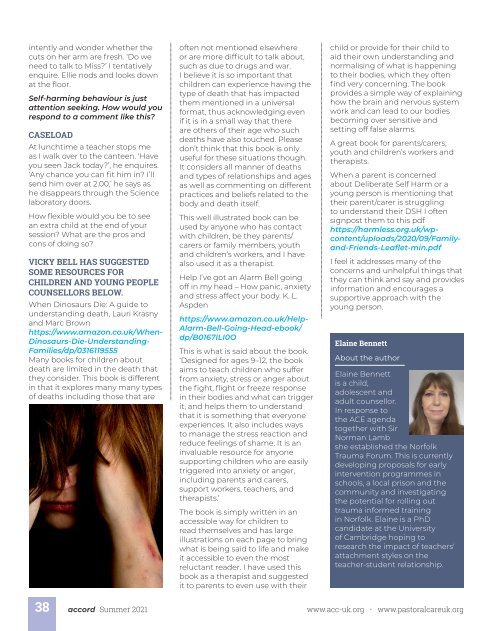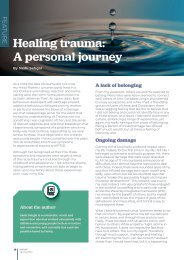ACC Accord Summer 2021 Issue 111
Create successful ePaper yourself
Turn your PDF publications into a flip-book with our unique Google optimized e-Paper software.
intently and wonder whether the<br />
cuts on her arm are fresh. ‘Do we<br />
need to talk to Miss?’ I tentatively<br />
enquire. Ellie nods and looks down<br />
at the floor.<br />
Self-harming behaviour is just<br />
attention seeking. How would you<br />
respond to a comment like this?<br />
CASELOAD<br />
At lunchtime a teacher stops me<br />
as I walk over to the canteen. ‘Have<br />
you seen Jack today?’, he enquires.<br />
‘Any chance you can fit him in? I’ll<br />
send him over at 2.00,’ he says as<br />
he disappears through the Science<br />
laboratory doors.<br />
How flexible would you be to see<br />
an extra child at the end of your<br />
session? What are the pros and<br />
cons of doing so?<br />
VICKY BELL HAS SUGGESTED<br />
SOME RESOURCES FOR<br />
CHILDREN AND YOUNG PEOPLE<br />
COUNSELLORS BELOW.<br />
When Dinosaurs Die: A guide to<br />
understanding death, Lauri Krasny<br />
and Marc Brown<br />
https://www.amazon.co.uk/When-<br />
Dinosaurs-Die-Understanding-<br />
Families/dp/0316119555<br />
Many books for children about<br />
death are limited in the death that<br />
they consider. This book is different<br />
in that it explores many many types<br />
of deaths including those that are<br />
often not mentioned elsewhere<br />
or are more difficult to talk about,<br />
such as due to drugs and war.<br />
I believe it is so important that<br />
children can experience having the<br />
type of death that has impacted<br />
them mentioned in a universal<br />
format, thus acknowledging even<br />
if it is in a small way that there<br />
are others of their age who such<br />
deaths have also touched. Please<br />
don’t think that this book is only<br />
useful for these situations though.<br />
It considers all manner of deaths<br />
and types of relationships and ages<br />
as well as commenting on different<br />
practices and beliefs related to the<br />
body and death itself.<br />
This well illustrated book can be<br />
used by anyone who has contact<br />
with children, be they parents/<br />
carers or family members, youth<br />
and children’s workers, and I have<br />
also used it as a therapist.<br />
Help I’ve got an Alarm Bell going<br />
off in my head – How panic, anxiety<br />
and stress affect your body. K. L.<br />
Aspden<br />
https://www.amazon.co.uk/Help-<br />
Alarm-Bell-Going-Head-ebook/<br />
dp/B0167ILI0O<br />
This is what is said about the book.<br />
‘Designed for ages 9–12, the book<br />
aims to teach children who suffer<br />
from anxiety, stress or anger about<br />
the fight, flight or freeze response<br />
in their bodies and what can trigger<br />
it, and helps them to understand<br />
that it is something that everyone<br />
experiences. It also includes ways<br />
to manage the stress reaction and<br />
reduce feelings of shame. It is an<br />
invaluable resource for anyone<br />
supporting children who are easily<br />
triggered into anxiety or anger,<br />
including parents and carers,<br />
support workers, teachers, and<br />
therapists.’<br />
The book is simply written in an<br />
accessible way for children to<br />
read themselves and has large<br />
illustrations on each page to bring<br />
what is being said to life and make<br />
it accessible to even the most<br />
reluctant reader. I have used this<br />
book as a therapist and suggested<br />
it to parents to even use with their<br />
child or provide for their child to<br />
aid their own understanding and<br />
normalising of what is happening<br />
to their bodies, which they often<br />
find very concerning. The book<br />
provides a simple way of explaining<br />
how the brain and nervous system<br />
work and can lead to our bodies<br />
becoming over sensitive and<br />
setting off false alarms.<br />
A great book for parents/carers,<br />
youth and children’s workers and<br />
therapists.<br />
When a parent is concerned<br />
about Deliberate Self Harm or a<br />
young person is mentioning that<br />
their parent/carer is struggling<br />
to understand their DSH I often<br />
signpost them to this pdf<br />
https://harmless.org.uk/wpcontent/uploads/2020/09/Familyand-Friends-Leaflet-min.pdf<br />
I feel it addresses many of the<br />
concerns and unhelpful things that<br />
they can think and say and provides<br />
information and encourages a<br />
supportive approach with the<br />
young person.<br />
Elaine Bennett<br />
About the author<br />
Elaine Bennett<br />
is a child,<br />
adolescent and<br />
adult counsellor.<br />
In response to<br />
the ACE agenda<br />
together with Sir<br />
Norman Lamb<br />
she established the Norfolk<br />
Trauma Forum. This is currently<br />
developing proposals for early<br />
intervention programmes in<br />
schools, a local prison and the<br />
community and investigating<br />
the potential for rolling out<br />
trauma informed training<br />
in Norfolk. Elaine is a PhD<br />
candidate at the University<br />
of Cambridge hoping to<br />
research the impact of teachers'<br />
attachment styles on the<br />
teacher-student relationship.<br />
38 accord <strong>Summer</strong> <strong>2021</strong> www.acc-uk.org • www.pastoralcareuk.org



